In Japanese, ~ni shite ~にして (the te-form of ~ni suru ~にする), sometimes has meanings similar to de で, such as "to be X and [Y];" "that said" conjunction at start of sentences; and, in the ~ni shite-iru ~にしている form, "to stay being X," besides the typical meanings you'd expect from the te-form of ~ni suru.
- {saigo ni} shite saikyou no teki
最後にして最強の敵
The {strongest} and last enemy.
The enemy that is both {the strongest} and the last one. - saigo de saikyou no teki
最後で最強の敵 - sore ni shite mo
それにしても
That said. Even considering that. Regardless. - sore demo
それでも
Despite that. Even if that's true. Regardless. - ii ko ni shite-iru
いい子にしている
To be being a good kid. (deliberately.) - ii ko de iru
いい子でいる
To be being a good kid.
Grammar
See the article about suru する for grammar. This article is mainly for examples.
In summary: de で is a contraction of nite にて which is an abbreviated form of ni shite にして(Masuda, 2002:126–127, citing Hashimoto, 1969, among others), which explains why ni shite にして is somewhat similar to de で even in modern Japanese.
Examples
To Be X and Y
You'll generally find this usage when describing something epic, specially in literary language, e.g. talking about kings, kingdoms, and so on.
- Context: an explanation of what the king is.
- maou, {{makai no shihaisha ni} shite} {subete wo gyuujiru} akuma no ou
魔王 悪魔の支配者にしてすべてを牛耳る悪魔の王
Demon-king: [he] {is {the lord of the demon world}, and} the king of demons [that] {rules over everything}.- Here, we're saying the maou is the makai no shihaisha on top of also being subete wo gyuujiru akuma no ou.
- Context: text of lore tablet as seen in Hollow Knight's Japanese translation.
- For reference, you can watch a VTuber (Shirakami Fubuki 白上フブキ) reading this part out loud: 【#1】 Hollow Knight 【ホロライブ/白上フブキ】 - via youtube.com
- Beware you'll be spoiled if you watch the video series before playing Hollow Knight (she played it until the ending).
- {kouki na} mono yo, kore wa {sonata dake ni tsutaeru} kotoba.
高貴な者よ、これはそなただけに伝える言葉。
{Noble} one, these are words {to convey to you alone}.
Higher beings, these words are for you alone. (original English) - kore yori saki, sonata wa ou to souzoushu no chi ni hairu.
これより先、そなたは王と創造主の地に入る。
Beyond this point, you'll enter the land of the king and creator.
Beyond this point you enter the land of King and Creator. (original English) - sono shikii wo koe, ware-ra no hou ni shitagau ga ii
その敷居を越え、我らの法に従うがいい。
Cross its threshold and obey our laws.
Step across this threshold and obey our laws. (original English.) - soshite mokugekisha to naru no da.
そして目撃者となるのだ。
And become witness. - {{saigo ni} shite} tada hitotsu no bunmei, {eien naru} oukoku, "Harounesuto" no.
最後にして唯ひとつの文明、永遠なる王国、”ハロウネスト”の。
The culture [that] {is {the last} and} the only one, the kingdom [that] {is eternal}. Of Hallownest.
The {{last} and} only culture, the eternal kingdom. Of Hallownest.
Bear witness to the last and only civilisation, the eternal Kingdom. Hallownest. (original English.)
- The Japanese version ends with a no-adjective that qualifies mokugekisha of a previous sentence.
- Harounesuto no mokugekisha to naru no da.
ハロウネストの目撃者となるのだ
Become witness of Hallownest.
Become Hallownest's witness.
To Deliberately Be
- Context: Harima Kenji 播磨拳児 feeds Napoleon, ナポレオン.
- gatsu gatsu
ガツガツ
*eating noise* - ponpon
ポンポン
*tap tap* - {{ii} ko ni} shitero yo, Naporeon
良い子にしてろよ、ナポレオン
Be {a {good} [pig]}, Napoleon.- shitero - contraction of shite-iro していろ, meireikei 命令形 of shite-iru.
- Harima Kenji leaves Napoleon behind.
- buhi?
ブヒ?
*concerned pig noise*
- Context: guy comes take his child from a "nursery school," hoikuen 保育園.
- a... arigatou gozaimashita!!
あ・・・ありがとうございました!!
T... thank you [for everything]!!- Past tense of arigatou gozaimasu.
- sensee sayounara
せんせーさようなら
Good bye, teacher. - sayounara
さようなら
Good bye. - otonashii kara chotto dake shinpai datta kedo
おとなしいからちょっとだけ心配だったけど
[She's] quiet so [I] was a bit worried, but - Rin-chan φ {{tottemo ii} ko ni} shitemashita yo
りんちゃんとってもいい子にしてましたよ!!
Rin-chan was {a {very} good [girl]}, [you see]!!- ni shitemashita - contraction of ni shite-imashita.
Conjunction
- Context: a tsundere and her friend run to school.
- ni shitemo Asuna
にしてもアスナ
[That said,] Asuna, - ashi φ hayai yo nee
足速いよねー
[Your] legs are fast. (literally.)
You [run] fast.- Asuna wa ashi ga hayai
アスナは足が速い
Asuna's legs are fast.
- Asuna wa ashi ga hayai
- watashi φ kore ya no ni
私コレやのに
Even though [for] me, [I] have this.- ya no ni - same as na no ni なのに.
- This means the roller-skates. She's running at the same speed the other is rollerskating.
- warukatta wa ne
悪かったわね
[Well, I'm sorry].- This is sarcasm.
- tairyoku baka de
体力バカで
For being a physical-strength baka.- i.e. for having so much stamina, endurance, agility, strength, etc.
Sometimes, the conjunctive usage occurs without ni に.
- Context: Kongming 孔明, a 3rd-century Chinese strategist with, like, 1 million IQ, is reincarnated in the modern world and is trying to learn about modern technology.
- shite, kono.. burokkucheen no sakusei towa ikanaru koto deshou?
して この・・ブロックチェーンの作成とはいかなる事でしょう?
Then, this.. [so-called] blockchain creation, [what is it supposed to be]?- de, kono..
で この・・
So, this.. - ikanaru - same as dou iu どういう, dono you na どのような, "what sort of."
- ikanaru koto - what sort of thing [is it supposed to be].
- de, kono..
Usual Usage
For the record, ~ni shite ~にして also has the typical uses you'd expect in the te-form of ~ni suru.
It can be used to connect the verb suru to a hojo-doushi 補助動詞 (auxiliary verb), like this:
- Context: an angel is granting any desires to a soul about to be reincarnated.
- jaa {furou-fushi ni} shite-kudasai
じゃあ不老不死にしてください
Then, please make [me] {immortal}.- furou-fushi
不老不死
Non-aging, non-dying. (yojijukugo 四字熟語)
Perpetually young and immortal. - kudasai - auxiliary verb translation to "please."
- furou-fushi
- waku
わく
*excited* - hai!
はい!
Okay! - don
ドン
*bam* - {sonna assari dekiru} mono nanoka
そんなあっさりできるものなのか
It's something [that] {can be done so easily}? - subarashii
素晴らしい
Marvelous. - dewa karada no naka wo mana ga guruguru guruguru junkan shite {{oiru} koto no nai} karada ni itashimashou!
では体の中をマナがぐるぐるぐるぐる循環して老いることのない体にいたしましょう!
Then, let's make the mana circulate around and around through inside of [your] body, and turn [it] into a body [that] {never {ages}}.- wo を particle - marks the medium through which movement happens.
- mana
マナ
Common term for magical energy in role-playing games. Also known as MP, magic points, magic power. - oiru
老いる
To age. To grow old. - ~koto ga nai
~ことがない
To never [do something]. (to never age). - ~koto no nai
~ことのない
(same as above, see: no の subject marker.) - ~ni itashimasu
~にいたします
- guruguru
ぐるぐる
*swirling motion* - hoka niwa?
他には?
[Anything else]?
And it can be used to connect two clauses, like this:
Anime: Kyou kara Ore wa!! 今日から俺は!! (Episode 1)
- Context: Takashi decides to become a delinquent, specifically: a yankii ヤンキー.
- {{kinpatsu ni} shite} paama wo kakete kudasai
金髪にしてパーマをかけてください
{Make [my hair] {blonde} and} apply a perm.- kinpatsu ni suru - to make [it] blonde.
- paama wo kakeru - to apply a perm.
- {hontou ni} ii no? koukousei desho
本当にいいの?高校生でしょ
Is that {really} alright? [You] are a high schooler, aren't you? - ii-n-desu. gaikoku niwa takusan imasu kara
いいんです。外国にはたくさんいますから
It's alright. Because there are a lot [of blonde people] in foreign countries.
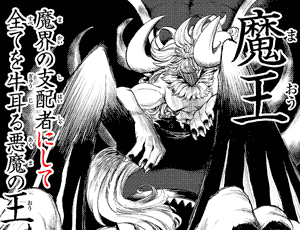
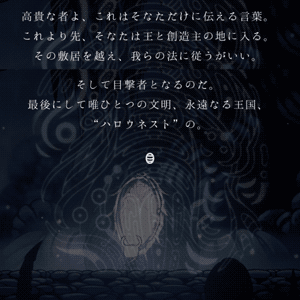
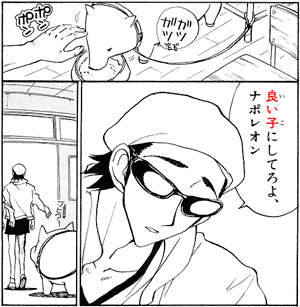

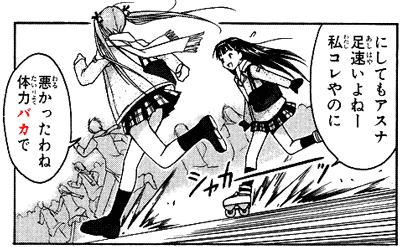

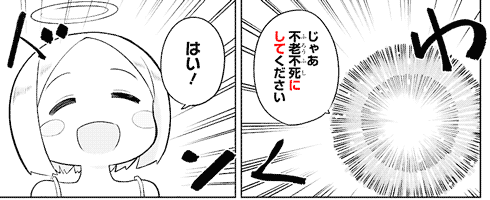
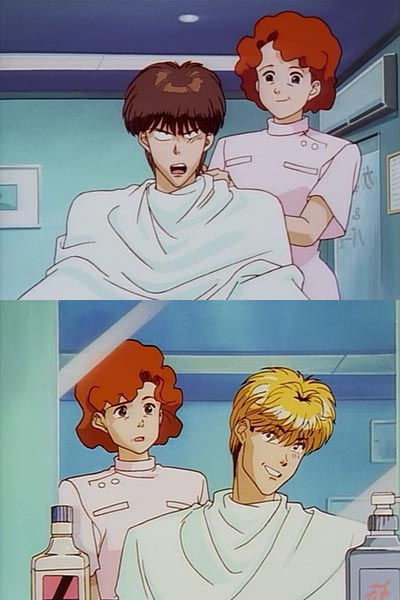
No comments: